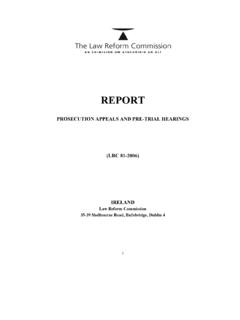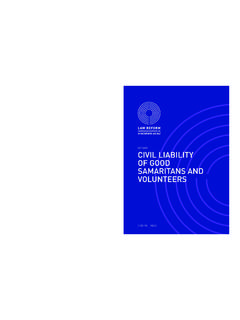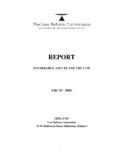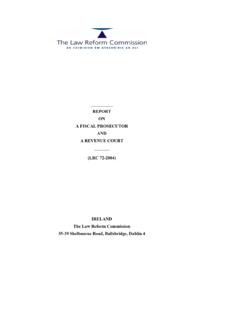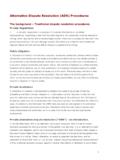Transcription of ALTERNATIVE DISPUTE MEDIATION AND CONCILIATION
1 REPORT(LRC 98-2010) ALTERNATIVE DISPUTE resolution : MEDIATION AND CONCILIATIONThe Law Reform Commission is an independent statutory body established by the Law Reform Commission Act 1975. The Commission s principal role is to keep the law under review and to make proposals for reform, in particular by recommending the enactment of legislation to clarify and modernise the law. This role is carried out primarily under a Programme of Law Reform. The Commission s Third Programme of Law Reform 2008-2014 was prepared and approved under the 1975 Act following broad consultation and discussion. The Commission also works on specific matters referred to it by the Attorney General under the 1975 Act. Since 2006, the Commission s role also includes two other areas of activity, Statute Law Restatement and the Legislation Directory. Statute Law Restatement involves incorporating all amendments to an Act into a single text, making legislation more accessible.
2 The Legislation Directory (previously called the Chronological Tables of the Statutes) is a searchable guide to legislative changes.+353 1 Shelbourne Road Dublin 4 IrelandADDRESSTELEPHONEFAXEMAILWEBSITE+3 53 1 6377601 The Law Reform Commission is a statutory body established by the Law Reform Commission Act 1975 ALTERNATIVE DISPUTE resolution : MEDIATION AND CONCILIATIONREPORTLRC 98-2010113681 - LRC ALTERNATIVE DISPUTE 109/11/2010 14 113681 - LRC ALTERNATIVE DISPUTE 209/11/2010 14:29 REPORT ALTERNATIVE DISPUTE resolution : MEDIATION AND CONCILIATION (LRC 98-2010) COPYRIGHT Law Reform Commission FIRST PUBLISHED November 2010 ISSN 1393-3132 ii LAW REFORM COMMISSION S ROLE The Law Reform Commission is an independent statutory body established by the Law Reform Commission Act 1975. The Commission s principal role is to keep the law under review and to make proposals for reform, in particular by recommending the enactment of legislation to clarify and modernise the law.
3 Since it was established, the Commission has published over 150 documents (Consultation Papers and Reports) containing proposals for law reform and these are all available at Most of these proposals have led to reforming legislation. The Commission s role is carried out primarily under a Programme of Law Reform. Its Third Programme of Law Reform 2008-2014 was prepared by the Commission following broad consultation and discussion. In accordance with the 1975 Act, it was approved by the Government in December 2007 and placed before both Houses of the Oireachtas. The Commission also works on specific matters referred to it by the Attorney General under the 1975 Act. Since 2006, the Commission s role includes two other areas of activity, Statute Law Restatement and the Legislation Directory. Statute Law Restatement involves the administrative consolidation of all amendments to an Act into a single text, making legislation more accessible.
4 Under the Statute Law (Restatement) Act 2002, where this text is certified by the Attorney General it can be relied on as evidence of the law in question. The Legislation Directory - previously called the Chronological Tables of the Statutes - is a searchable annotated guide to legislative changes. After the Commission took over responsibility for this important resource, it decided to change the name to Legislation Directory to indicate its function more clearly. iii MEMBERSHIP The Law Reform Commission consists of a President, one full-time Commissioner and three part-time Commissioners. The Commissioners at present are: President: The Hon Mrs Justice Catherine McGuinness Former Judge of the Supreme Court Full-time Commissioner: Patricia T. Rickard-Clarke, Solicitor Part-time Commissioner: Professor Finbarr McAuley Part-time Commissioner: Marian Shanley, Solicitor Part-time Commissioner: The Hon Mr Justice Donal O Donnell, Judge of the Supreme Court iv LAW REFORM RESEARCH STAFF Director of Research: Raymond Byrne BCL, LLM (NUI), Barrister-at-Law Legal Researchers: Dannie Hanna BCL (NUI), LLM (Cantab) Helen Kehoe BCL (Law with French Law) (NUI), LLM (Dub), Solicitor Donna Lyons LLB (Dub), LLM (NYU) Tara Murphy BCL (Law with French Law) (NUI), LLM (Essex), Barrister-at-Law Jane O Grady BCL, LLB (NUI), LPC (College of Law) Darelle O Keeffe LLB (UL), H Dip Soc Pol (NUI), EMA (EIUC) Helen Whately LLB, LLM (Dub) STATUTE LAW RESTATEMENT Project Manager for Restatement: Alma Clissmann, BA (Mod), LLB, Dip Eur Law (Bruges), Solicitor Legal Researcher: Andrew Glynn BBLS (NUI), LLM (Dub) LEGISLATION DIRECTORY Project Manager for Legislation Directory: Heather Mahon LLB (ling.)
5 Ger.), , Barrister-at-Law Legal Researcher: Aoife Clarke BA (Int.), LLB, LLM (NUI) v ADMINISTRATION STAFF Executive Officers: Deirdre Bell Simon Fallon Legal Information Manager: Conor Kennedy BA, H Dip LIS Cataloguer: Eithne Boland BA (Hons), HDip Ed, HDip LIS Clerical Officers: Ann Browne Ann Byrne Liam Dargan PRINCIPAL LEGAL RESEARCHER FOR THIS REPORT Nicola White LLB, LLM (Dub), Attorney at Law (NY) vi CONTACT DETAILS Further information can be obtained from: Law Reform Commission 35-39 Shelbourne Road Ballsbridge Dublin 4 Telephone: +353 1 637 7600 Fax: +353 1 637 7601 Email: Website: vii ACKNOWLEDGEMENTS The Commission would like to thank the following people who provided valuable assistance: Mr Fergus Armstrong, Director, One Resolve Mr William Aylmer, Partner, Compton Aylmer Solicitors Mr Joe Behan, Chartered Institute of Arbitrators Irish Branch Mr Ciaran Breen, Director, State Claims Agency Mr James Bridgeman, Senior Counsel Dr Nael Bunni, Chartered Engineer, Bunni & Associates Ms Bernadette Casey, Mediator Ms Maureen Chalmers, Senior Social Worker, WISE Mr Oliver Connolly, FriaryLaw ADR Mr Michael Culloty, National Social Policy & Communications Officer, MABS Ms Susan Dowling, DISPUTE resolution Adviser, ECC Dublin Mr Liam Duffy, Dublin Hospitals Group Risk Management Forum Ms Karen Erwin, President, Mediators Institute of Ireland Mr Ciaran Fahy, Chartered Institute of Arbitrators Mr Ronan Feehily, Solicitor Ms Nicola Flannery, Solicitor Mr Jay Folberg, Executive Director, JAMS Foundation (US-based ADR organisation)
6 Mr Michael Gorman, FriaryLaw ADR Ms Wendy Gray, Department of Enterprise Trade & Employment Mr Eamon Harrington, Solicitor, Comyn Kelleher Solicitors Ms Tricia Hayes, Mediator Mr David Hickey, Coordinator, Cork Community MEDIATION Service Ms Maria Hurley, Director of Policy, Advocacy & Communications, National Consumer Agency Ms Phyl Kealy, Solicitor Mr Joseph Kelly, Partner, A & L Goodbody Solicitors & former Chairman of the Law Society Committee on Arbitration & MEDIATION Mr David Lawless, Solicitor Mr Kevin Liston, Solicitor Mr Ed Madden, National University of Ireland Maynooth Mr Patrick Maguire, Chartered Accountant, Maguire & Co Mr Sheila Maguire, Solicitor, Daniel O Connell & Son Ms Patricia Mallon, Partner, Eoin Daly Solicitors Ms Paulyn Marrinan Quinn, Senior Counsel and Ombudsman for the Defence Forces Mr Johnnie McCoy, Barrister-at-Law Mr Donagh McGowan, Solicitor, Mason, Hayes & Curran Solicitors Mr Robert O Donnell, Director, Woodstock Institute for Negotiation Mr Turlough O Donnell, Senior Counsel Ms Polly Phillimore, Family MEDIATION Service Ms Melanie Pine, Director, The Equality Tribunal Mr Noel Rubotham, Director of Reform & Development, Courts Service Ms Delma Sweeney, National University of Ireland Maynooth Mr Gordon Wade, FriaryLaw ADR Hon Daniel Weinstein, JAMS Mr Michael Williams, Solicitor Full responsibility for this publication lies, however, with the Commission.
7 Ix TABLE OF CONTENTS INTRODUCTION 1 A Background to the Report 1 B The Commission s approach to ALTERNATIVE DISPUTE resolution , in particular MEDIATION and CONCILIATION 1 (1) The role of the courts in encouraging parties to agree solutions 1 (2) Delays in the court process and the development of ADR 1 (3) The court process and ADR 2 (4) Efficiency, including cost efficiency 2 (5) Other benefits of ADR, including flexibility 3 (6) An integrated approach to DISPUTE resolution 3 (7) The main focus of the Report 4 C Outline of Report Chapters 4 CHAPTER 1 ADR: AN OVERVIEW 7 A Introduction 7 B Access to Justice and ADR 7 C Appropriateness of ADR 9 D Conclusion 11 CHAPTER 2 ADR: TERMINOLOGY & SCOPE 13 A Introduction 13 B Definition and scope of the term ADR 13 (1) ADR: DISPUTE resolution and Prevention 13 (2) General Scope of ADR 15 C Distinguishing between MEDIATION and CONCILIATION 17 (1) Role of the Third Party 17 (2) Rights Based v Interest Based Resolutions 18 (3) Conclusion 18 D Statutory Definition of MEDIATION 19 (1) Structured Formal Process 20 (2) Differing Models of MEDIATION 20 (3) Conclusion 22 E Statutory Definition of CONCILIATION 22 F General Scope of Statutory MEDIATION & CONCILIATION 24 (1) Civil & Commercial disputes 24 (2) Cross-Border Civil & Commercial disputes 26 G Conclusion 27 CHAPTER 3 GENERAL PRINCIPLES OF MEDIATION & CONCILIATION 29 A Introduction 29 B Consultation Paper 29 C Voluntary Nature of MEDIATION & CONCILIATION 30 (1) Consultation Paper 30 (2) Right to Withdraw from MEDIATION or CONCILIATION 30 (3) Conclusion 32 D Confidentiality 32 (1) Consultation Paper 32 (2) Increase of Satellite Litigation 33 x (3)
8 Confidentiality in the 2008 EC Directive on MEDIATION 37 (4) Distinct Form of Privilege for MEDIATION & CONCILIATION 38 (5) MEDIATION and CONCILIATION Communications 40 (6) Holders of the Privilege 41 (7) Waiver of the Privilege 42 (8) Exceptions to the Privilege 42 (9) Party expectations of confidentiality outside of proceedings 45 (10)Conclusion 45 E Self-Determination 46 (1) Consultation Paper 46 (2) Capacity to Participate 47 (3) Informed Consent 48 (4) Seeking Independent Advice During a MEDIATION or CONCILIATION 49 (5) Conclusion 50 F Efficiency 51 (1) Costs of MEDIATION or CONCILIATION 51 (2) Duration of MEDIATION or CONCILIATION 52 (3) ADR Efficiency & Public Sector disputes 53 G Legal Aid for MEDIATION and CONCILIATION 56 H Flexibility 59 I Neutrality & Impartiality 60 (1) Consultation Paper 60 (2) Duty to Disclose Conflict of Interests 62 J Enforceability 63 K Limitation Periods 63 L Quality and Transparency of Procedure 64 CHAPTER 4 ADR & THE CIVIL JUSTICE SYSTEM 65 A Introduction 65 B Enforceability of DISPUTE resolution Clauses 65 (1) Power to stay proceedings 65 (2) Severability of MEDIATION and CONCILIATION clauses 70 C MEDIATION or CONCILIATION where there is no referral clause 71 (1) Provision of Information on ADR 71 (2) Role of Legal Representatives 72 (3) Requirement to file a MEDIATION and CONCILIATION certificate 76 (4) Conclusion 77 D Referral to MEDIATION or CONCILIATION After Litigation Has Begun 78 (1) Consultation Paper 78 (2)
9 Role of the Court in Encouraging ADR 78 (3) Court-Annexed MEDIATION Scheme 83 E Limitation Periods 84 F Enforceability of Agreements 86 (1) Self Determination & Enforceability 87 (2) Enforcement as a contract 87 (3) Enforcement by a Court 88 G Costs: Sanctions and Recovery 90 (1) Cost Sanctions: Good Faith Requirement 90 xi (2) Criteria for Imposing a Costs Sanction 91 (3) Recovery of MEDIATION and CONCILIATION Costs 93 H Content of Mediators and Conciliators Reports to Court 94 CHAPTER 5 EMPLOYMENT disputes & INDUSTRIAL RELATIONS: THE ROLE OF ADR 97 A Introduction 97 B Employment disputes & ADR: An Overview 97 (1) Nature of Workplace disputes 97 C Private Workplace ADR & DISPUTE System Design 98 D ADR Clauses in Employment Contracts 102 E Conclusion 102 CHAPTER 6 FAMILY disputes & ADR 105 A Introduction 105 B Family disputes in Ireland 105 C Information Meetings 106 (1) Consultation Paper on ADR & Report on Family Courts 106 (2) Mandatory Information Sessions 107 D Parenting Plans 109 E Family MEDIATION 110 (1) Legislative Development of Family MEDIATION in Ireland 111 (2) Role of Advisers in Family MEDIATION 112 (3) Enforcement & Review of Mediated Agreements113 (4) Voice of the Child in Family MEDIATION 114 (5) Screening in Family MEDIATION 116 F Collaborative Practice 117 (1) Training for Collaborative Practitioners 118 (2) Code of Practice for Collaborative Practitioners 119 (3) Referral to Collaborative Practice 121 (4)
10 Conclusion 121 G Family Probate disputes & ADR 121 (1) Estate & Succession Planning 122 (2) Section 117 of the Succession Act 1965 123 H Elder MEDIATION 125 (1) Family disputes & Elder Transitions 125 (2) Elder MEDIATION 126 CHAPTER 7 PERSONAL INJURIES & ADR 129 A Introduction 129 B Consultation Paper 129 C Clinical Claims & ADR: An Overview 129 D Early Neutral Evaluation (ENE) 132 (1) The Personal Injuries Assessment Board and Early Neutral Evaluation 132 (2) Medical Negligence disputes & Early Neutral Evaluation 133 E MEDIATION & the Civil Liability and Courts Act 2004 135 F An Open Disclosure Policy and the Power of an Apology 137 (1) Policy of Open Disclosure 137 (2) The Power of an Apology 139 xii CHAPTER 8 COMMERCIAL disputes & ADR 143 A Introduction 143 B Commercial disputes & ADR: An Overview 143 (1) Internal Corporate DISPUTE resolution Strategies 145 (2) ADR Clauses 146 (3) ADR Corporate Pledge 146 C Commercial Court & ADR 147 D Shareholder disputes & ADR 148 E Construction disputes & ADR 149 (1) ADR Clauses in Irish Government Public Works Contracts 149 (2) Role for MEDIATION in Resolving Construction disputes 150 F International Commercial DISPUTE resolution 152 G Conclusion 154
